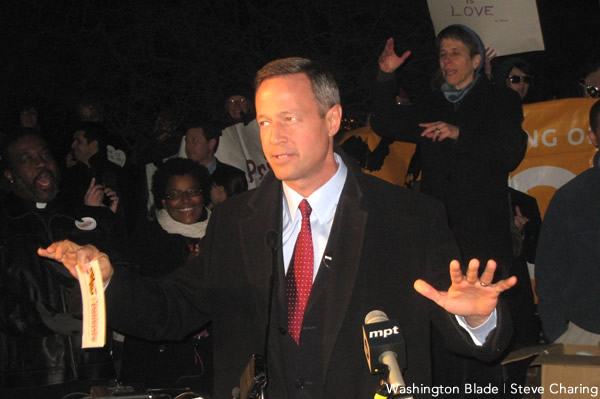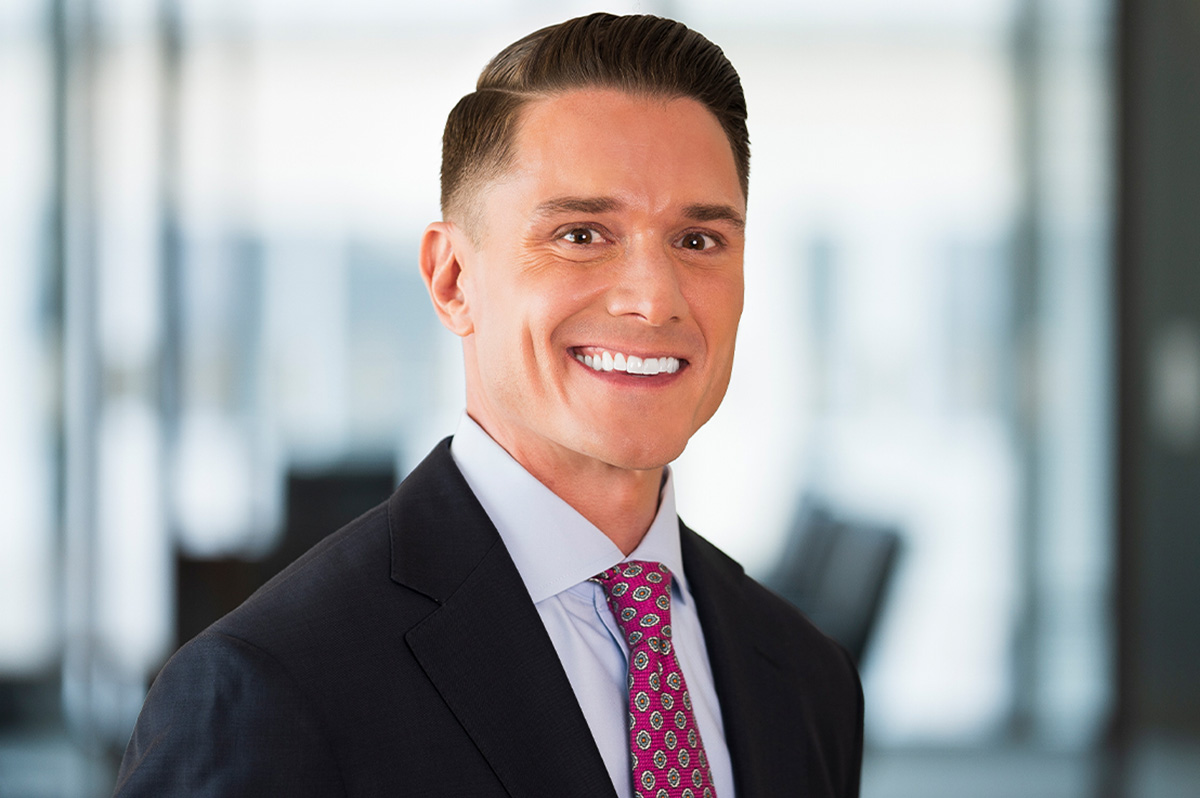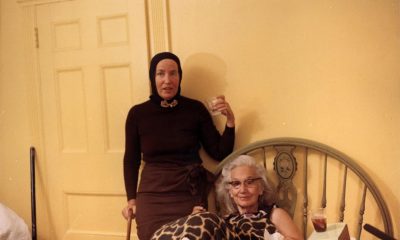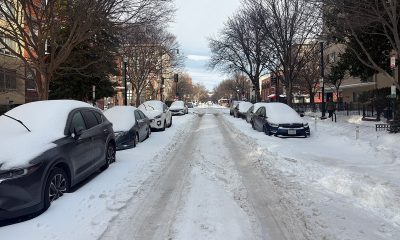Local
UPDATE: Md. braces for close vote on marriage
House committee advances bill; GOP lawmaker announces support


About 500 LGBT rights supporters turned out for the annual Lobby Day in Annapolis this week. For the first time, Gov. Martin O’Malley addressed the gathering. (Washington Blade photo by Steve Charing)
The Maryland House of Delegates is preparing for a close vote on a bill to legalize same-sex marriage on Friday.
The vote is expected just days after the measure was moved to the floor following approval by a joint committee on Tuesday.
Gov. Martin O’Malley introduced the Civil Marriage Protection Act as part of his legislative package. A similar measure passed the Senate but died in the House last year after supporters determined they didn’t have sufficient votes for passage in the lower chamber.
“Today’s vote on the Civil Marriage Protection Act is a significant step forward for the passage of this bill in Maryland,” O’Malley said in a statement after Tuesday’s committee vote. “Together, we will continue our work to ensure that our State protects religious freedom and provides equal protection under the law for all Marylanders.”
The Judiciary Committee and the Health & Government Operations Committee heard joint testimony last week on the marriage bill. The committees voted jointly over several hours late Tuesday afternoon. The vote was 25-18 in favor, with one abstention, Del. Sam Arora (D-Mont. Co.), a former supporter of the bill.
“We just took another step toward civil marriage equality becoming a reality in Maryland; the momentum is with us,” the group Marylanders for Marriage Equality said in a statement. “We thank all supportive Delegates for their leadership on this very important issue that will improve the lives of thousands of Maryland families and help put the state on the right side of history.”
Del. Kathleen Dumais (D-Montgomery County), who serves as vice chair of the Judiciary Committee, said the marriage bill was scheduled to be taken up on the House floor on Thursday for a second-reading vote following an informal first-reading of the bill on the floor on Wednesday. All bills are open to proposed amendments during the second reading. She said a final, third reading, debate and vote on the bill was expected to take place in the House on Friday.
“I feel positive that it will pass the House this year,” she told the Blade on Wednesday.
Although supporters hailed the joint vote by the two committees to approve legislation to legalize same-sex marriage, a breakdown of the vote shows that the bill lost among Judiciary Committee members by a vote of 11-10, with the one abstention by Arora. The vote breakdown shows that Health and Government Operations Committee members voted to approve the bill by a margin of 15-7, with one member absent.
The large margin of approval by the HGO Committee clearly put the bill over the top in the combined vote. The development confirms speculation that House Speaker Michael Busch (D-Anne Arundel County) gave the HGO Committee jurisdiction over the bill along with the Judiciary panel this year because he knew in advance that the Judiciary Committee lacked the votes to approve a marriage bill.
The Judiciary panel approved the bill last year by a one-vote margin, with Chairman Joseph Vallario (D-Calvert & Prince George’s County) voting for the bill. Vallario voted against the bill at Tuesday’s joint committee session. Arora also voted for the bill in committee last year but made it clear that he would not vote for it on the House floor.
His abstention this year highlights the surprise and disappointment among many LGBT activists in Maryland who supported Arora’s 2010 election campaign in which he ran on a platform of support for a same-sex marriage equality bill. Last year he initially signed on as a co-sponsor for the bill before he announced that based on religious beliefs he could no longer support the legislation.
No vote was taken in the joint committee session on a proposed constitutional amendment to ban same-sex marriage, but the joint panel voted down five proposed amendments to the Civil Marriage Protection Act, including:
• An amendment to eliminate all sex education in public schools, which failed 26-17;
• An amendment calling for parental consent before using materials that address “non-traditional families” in schools, which failed 27-16;
• An amendment to prohibit minors from marrying someone of the same sex, which failed 26-17;
• An amendment to change the effective date of the bill to Jan. 1, 2013, which failed 24-21;
• And an amendment to change the bill from marriage to civil unions, which failed 27-17.
In a related development, Del. Robert Costa, a Republican from Anne Arundel County, announced Tuesday that he will vote for the marriage bill.
“I think it’s not a state function to decide who can marry,” the Annapolis Capital quoted him as saying. “I do what I believe is right for people. I don’t think that matters. I represent constituents and not a party.”
The announcement drew quick praise from LGBT advocates.
“The fact that Del. Costa is going to support this bill publicly is really demonstrating the momentum for this and how quickly the momentum is growing,” Equality Maryland Executive Director Carrie Evans told the Blade. “It’s significant like Sen. Allan Kittleman’s vote was last year. We know it isn’t a partisan issue. We finally see evidence that it’s not. Del. Costa represents a fairly rural district and he’s with us.”
And in another development, a one-time supporter of the same-sex marriage bill who startled LGBT advocates last year by saying she was backing away from her support told the Blade that she has yet to decide how she will vote on the bill this year.
Del. Jill Carter (D-Baltimore) told the Blade last week that she’s concerned that some news media outlets incorrectly reported last year that she voted against the same-sex marriage bill in committee.
“In fact, I voted for it,” she said. “I’m not ready to say what I’ll do this year.” She voted for the bill in committee Tuesday.
Carter spoke to the Blade outside a House of Delegates hearing room in Annapolis on Feb. 10 in which two committees conducted a joint hearing on both the Civil Marriage Protection Act, which would allow same-sex couples to marry, and a separate bill calling for a state constitutional amendment to restrict marriage to a union only between a man and a woman.
Similar to last year, political pundits in the state believe the Maryland Senate is poised to pass the marriage bill and reject the proposed constitutional amendment.
But observers say the marriage bill’s prospects in the House of Delegates are uncertain. Supporters say they hope to persuade the small number of delegates that declined to back the bill last year and who are needed for the bill’s passage this year to change their minds and vote for it.

The Comings & Goings column is about sharing the professional successes of our community. We want to recognize those landing new jobs, new clients for their business, joining boards of organizations and other achievements. Please share your successes with us at [email protected].
The Comings & Goings column also invites LGBTQ+ college students to share their successes with us. If you have been elected to a student government position, gotten an exciting internship, or are graduating and beginning your career with a great job, let us know so we can share your success.
Congratulations to David Reid on his new position as Principal, Public Policy, with Brownstein Hyatt Farber Schreck. Upon being named to the position, he said, “I am proud to be part of this inaugural group of principals as the firm launches it new ‘principal, public policy’ title.”
Reid is a political strategist and operative. He is a prolific fundraiser, and skilled advocate for legislative and appropriations goals. He is deeply embedded in Democratic politics, drawing on his personal network on the Hill, in governors’ administrations, and throughout the business community, to build coalitions that drive policy successes for clients. His work includes leading complex public policy efforts related to infrastructure, hospitality, gaming, health care, technology, telecommunications, and arts and entertainment.
Reid has extensive political finance experience. He leads Brownstein’s bipartisan political operation each cycle with Republican and Democratic congressional and national campaign committees and candidates. Reid is an active member of Brownstein’s pro-bono committee and co-leads the firm’s LGBT+ Employee Resource Group.
He serves as a Deputy National Finance Chair of the Democratic National Committee and is a member of the Finance Committee of the Democratic Governors Association, where he previously served as the Deputy Finance Director.
Prior to joining Brownstein, Reid served as the Washington D.C. and PAC finance director at Hillary for America. He worked as the mid-Atlantic finance director, for the Democratic Senatorial Campaign Committee and ran the political finance operation of a Fortune 50 global health care company.
Among his many outside involvements, Reid serves on the executive committee of the One Victory, and LGBTQ Victory Institute board, the governing bodies of the LGBTQ Victory Fund and Institute; and is a member of the board for Q Street.
Congratulations also to Yesenia Alvarado Henninger of Helion Energy, president; Abigail Harris of Honeywell; Alex Catanese of American Bankers Association; Stu Malec, secretary; Brendan Neal, treasurer; Brownstein’s David Reid; Amazon’s Suzanne Beall; Lowe’s’ Rob Curis; andCornerstone’s Christian Walker. Their positions have now been confirmed by the Q Street Board of Directors.
District of Columbia
D.C. pays $500,000 to settle lawsuit brought by gay Corrections Dept. employee
Alleged years of verbal harassment, slurs, intimidation

The D.C. government on Feb. 5 agreed to pay $500,000 to a gay D.C. Department of Corrections officer as a settlement to a lawsuit the officer filed in 2021 alleging he was subjected to years of discrimination at his job because of his sexual orientation, according to a statement released by the American Civil Liberties Union of D.C.
The statement says the lawsuit, filed on behalf of Sgt. Deon Jones by the ACLU of D.C. and the law firm WilmerHale, alleged that the Department of Corrections, including supervisors and co-workers, “subjected Sgt. Jones to discrimination, retaliation, and a hostile work environment because of his identity as a gay man, in violation of the D.C. Human Rights Act.”
Daniel Gleick, a spokesperson for D.C. Mayor Muriel Bowser, said the mayor’s office would have no comment on the lawsuit settlement. The Washington Blade couldn’t immediately reach a spokesperson for the Office of the D.C. Attorney General, which represents the city against lawsuits.
Bowser and her high-level D.C. government appointees, including Japer Bowles, director of the Mayor’s Office of LGBTQ Affairs, have spoken out against LGBTQ-related discrimination.
“Jones, now a 28-year veteran of the Department and nearing retirement, faced years of verbal abuse and harassment from coworkers and incarcerated people alike, including anti-gay slurs, threats, and degrading treatment,” the ACLU’s statement says.
“The prolonged mistreatment took a severe toll on Jones’s mental health, and he experienced depression, Post-Traumatic Stress Disorder, and 15 anxiety attacks in 2021 alone,” it says.
“For years, I showed up to do my job with professionalism and pride, only to be targeted because of who I am,” Jones says in the ACLU statement. “This settlement affirms that my pain mattered – and that creating hostile workplaces has real consequences,” he said.
He added, “For anyone who is LGBTQ or living with a disability and facing workplace discrimination or retaliation, know this: you are not powerless. You have rights. And when you stand up, you can achieve justice.”
The settlement agreement, a link to which the ACLU provided in its statement announcing the settlement, states that plaintiff Jones agrees, among other things, that “neither the Parties’ agreement, nor the District’s offer to settle the case, shall in any way be construed as an admission by the District that it or any of its current or former employees, acted wrongfully with respect to Plaintiff or any other person, or that Plaintiff has any rights.”
Scott Michelman, the D.C. ACLU’s legal director said that type of disclaimer is typical for parties that agree to settle a lawsuit like this.
“But actions speak louder than words,” he told the Blade. “The fact that they are paying our client a half million dollars for the pervasive and really brutal harassment that he suffered on the basis of his identity for years is much more telling than their disclaimer itself,” he said.
The settlement agreement also says Jones would be required, as a condition for accepting the agreement, to resign permanently from his job at the Department of Corrections. ACLU spokesperson Andy Hoover said Jones has been on administrative leave since March 2022. Jones couldn’t immediately be reached for comment.
“This is really something that makes sense on both sides,” Michelman said of the resignation requirements. “The environment had become so toxic the way he had been treated on multiple levels made it difficult to see how he could return to work there.”
Virginia
Spanberger signs bill that paves way for marriage amendment repeal referendum
Proposal passed in two successive General Assembly sessions

Virginians this year will vote on whether to repeal a state constitutional amendment that defines marriage as between a man and a woman.
Democratic Gov. Abigail Spanberger on Friday signed state Del. Laura Jane Cohen (D-Fairfax County)’s House Bill 612, which finalized the referendum’s language.
The ballot question that voters will consider on Election Day is below:
Question: Should the Constitution of Virginia be amended to: (i) remove the ban on same-sex marriage; (ii) affirm that two adults may marry regardless of sex, gender, or race; and (iii) require all legally valid marriages to be treated equally under the law?
Voters in 2006 approved the Marshall-Newman Amendment.
Same-sex couples have been able to legally marry in Virginia since 2014. Former Gov. Glenn Youngkin, who is a Republican, in 2024 signed a bill that codified marriage equality in state law.
Two successive legislatures must approve a proposed constitutional amendment before it can go to the ballot.
A resolution to repeal the Marshall-Newman Amendment passed in the General Assembly in 2025. Lawmakers once again approved it last month.
“20 years after Virginia added a ban on same-sex marriage to our Constitution, we finally have the chance to right that wrong,” wrote Equality Virginia Executive Director Narissa Rahaman on Friday in a message to her group’s supporters.
Virginians this year will also consider proposed constitutional amendments that would guarantee reproductive rights and restore voting rights to convicted felons who have completed their sentences.
-

 a&e features5 days ago
a&e features5 days agoMarc Shaiman reflects on musical success stories
-

 Television4 days ago
Television4 days agoNetflix’s ‘The Boyfriend’ is more than a dating show
-

 Movies5 days ago
Movies5 days ago50 years later, it’s still worth a return trip to ‘Grey Gardens’
-

 Opinions4 days ago
Opinions4 days agoSnow, ice, and politics: what is (and isn’t) happening




















